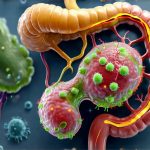The human gut is home to trillions of microorganisms – bacteria, archaea, fungi, viruses – collectively known as the gut microbiota. This complex ecosystem isn’t merely a passive inhabitant; it actively participates in numerous physiological processes vital for overall health. Increasingly, research highlights a profound and bidirectional relationship between the gut microbiota and our hormonal systems. Disruptions in this delicate balance can potentially influence hormone regulation, impacting everything from mood and energy levels to reproductive health and metabolic function.
Understanding this interplay is crucial as modern lifestyles – characterized by diets high in processed foods, overuse of antibiotics, chronic stress, and limited physical activity – significantly impact the composition and functionality of our gut microbiota. This article will explore the intricate connections between gut microbes and hormonal balance, providing a foundational understanding of how this relationship works and its potential implications for wellbeing.
The Gut-Hormone Axis: A Two-Way Street
The “gut-hormone axis” describes the constant communication occurring between the gut microbiota and various endocrine systems within the body. This isn’t a one-way street; hormones influence the composition of the gut microbiota just as much as the microbes impact hormone levels. For example, stress hormones like cortisol can alter microbial diversity while metabolites produced by gut bacteria affect hormone synthesis, metabolism, and excretion.
This complex interplay is facilitated through several mechanisms including the production of neurotransmitters, modulation of the hypothalamic-pituitary-adrenal (HPA) axis, regulation of immune function, and direct influence on hormone receptors. The gut microbiota’s ability to metabolize hormones also plays a significant role in determining circulating hormone levels and their overall effect on the body.
Beyond Digestion: Microbial Influence on Hormone Regulation
The gut microbiota doesn’t just aid in digestion; it actively participates in hormone regulation through multiple pathways. One key mechanism involves the production of metabolites like short-chain fatty acids (SCFAs) – acetate, propionate, and butyrate – which are produced when microbes ferment dietary fiber. These SCFAs have systemic effects, influencing energy metabolism, immune function, and even hormone signaling pathways. Another important process is the ‘estrobolome’, a collection of gut bacterial enzymes capable of metabolizing estrogens, impacting estrogen levels in the body.
Estrogen Metabolism & The Estrobolome
The estrobolome highlights the direct influence of gut bacteria on sex hormones. Estrogens are metabolized by intestinal bacteria into various metabolites that can either promote or hinder estrogenic activity. A healthy and diverse estrobolome supports optimal estrogen metabolism, reducing the risk of estrogen dominance (associated with conditions like endometriosis and certain cancers) while ensuring sufficient levels for essential bodily functions.
Dysbiosis – an imbalance in gut microbial communities – can lead to impaired estrogen metabolism, potentially contributing to hormonal imbalances and related health issues. Factors affecting estrobolome function include diet, antibiotic use, and overall gut health. Supporting a diverse gut microbiota through fiber-rich foods and minimizing antibiotic exposure may help optimize estrobolome activity.
Cortisol & The HPA Axis
The hypothalamic-pituitary-adrenal (HPA) axis is the body’s central stress response system, releasing cortisol to help manage stressors. Chronic stress can disrupt the gut microbiota composition, leading to increased intestinal permeability (“leaky gut”) and inflammation. This, in turn, exacerbates HPA axis dysfunction, creating a vicious cycle of stress and gut imbalance.
The gut microbiota influences the HPA axis by modulating immune responses and producing neurotransmitters that affect brain function. Certain bacterial strains have been shown to reduce cortisol levels and improve resilience to stress. Maintaining a healthy gut microbiome can potentially buffer the effects of chronic stress on hormone regulation, promoting better mental and physical wellbeing.
Thyroid Hormone Conversion & Gut Health
Thyroid hormones are crucial for metabolism, energy levels, and overall health. A significant portion of T4 (inactive thyroid hormone) is converted into T3 (active thyroid hormone) in the gut. The efficiency of this conversion is heavily influenced by the gut microbiota. Dysbiosis can impair this process, hindering optimal thyroid function even if initial T4 levels appear normal.
Certain gut bacteria are involved in selenium absorption, a mineral essential for thyroid hormone production and conversion. An unhealthy gut microbiome can reduce selenium uptake, further contributing to thyroid dysfunction. Supporting gut health through dietary interventions and probiotics may improve thyroid hormone conversion and overall thyroid function, though this is best assessed with professional guidance.
Ultimately, the relationship between gut microbiota and hormonal balance is complex and multifaceted. Emerging research continues to unravel the intricate mechanisms involved and the potential for targeted interventions to support both gut health and hormonal wellbeing. Focusing on a diet rich in fiber, managing stress levels, minimizing unnecessary antibiotic use, and prioritizing lifestyle factors that promote a diverse and thriving gut microbiome are key steps toward fostering this crucial connection.


















